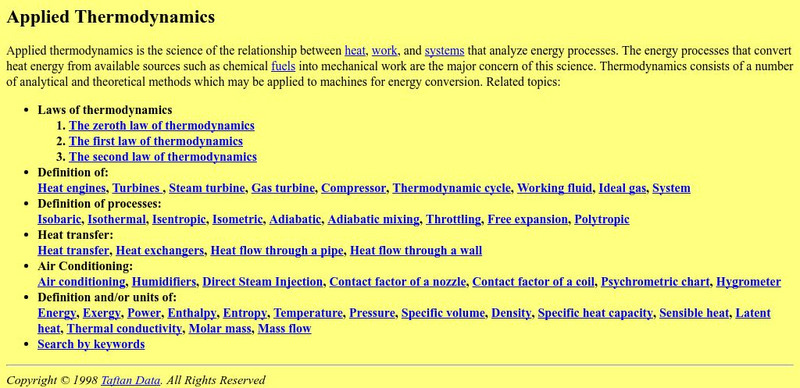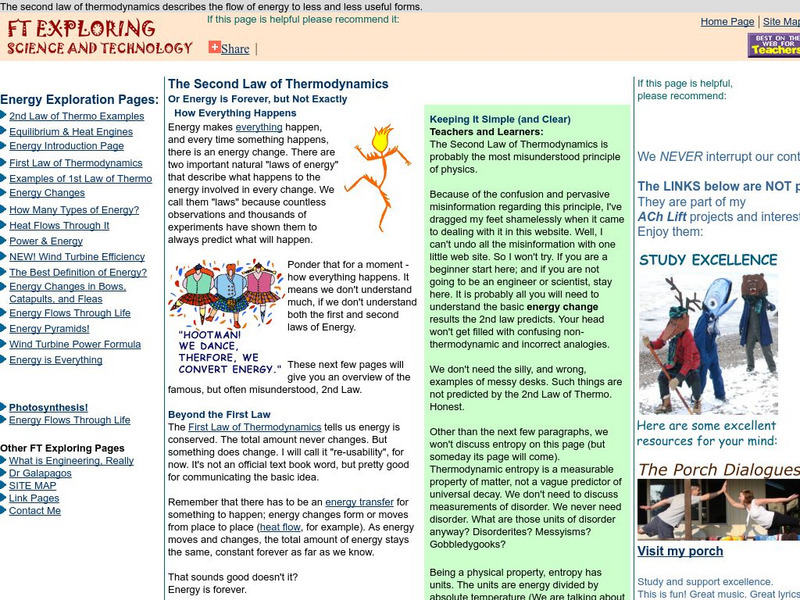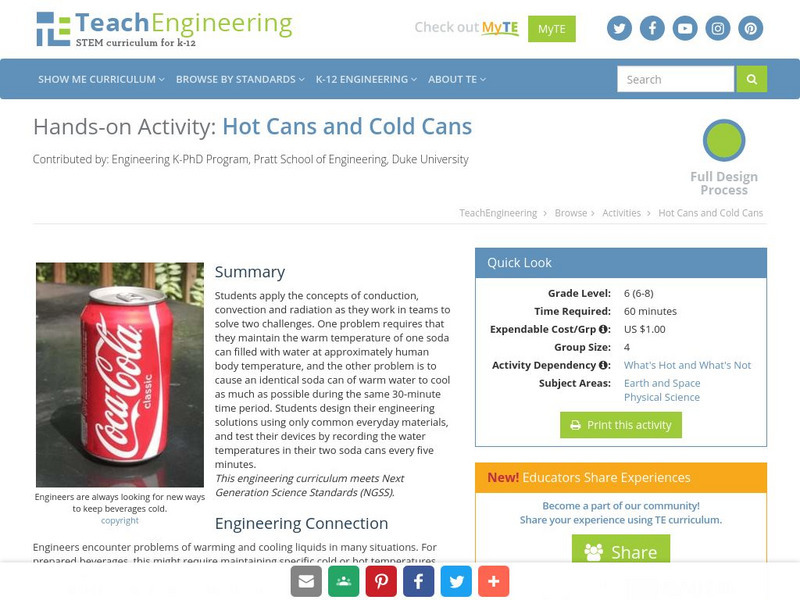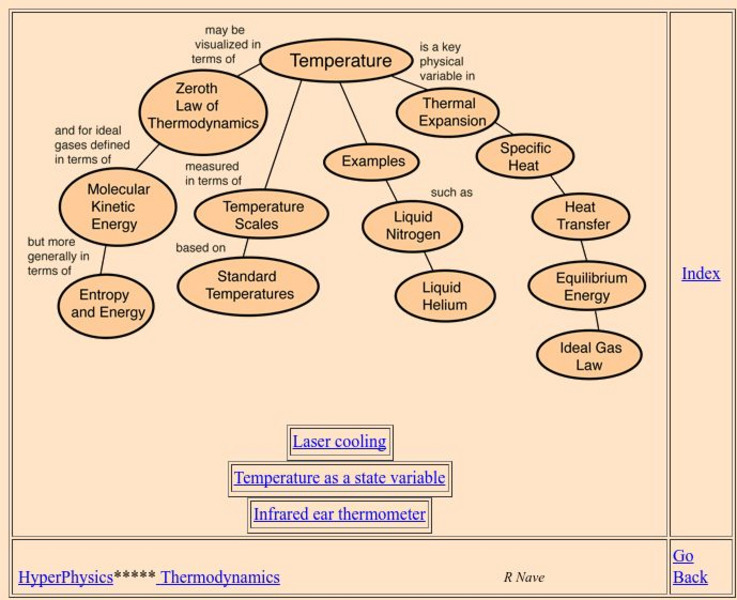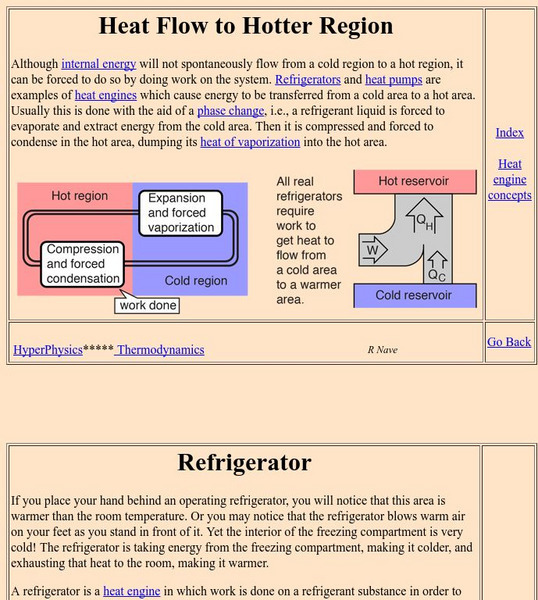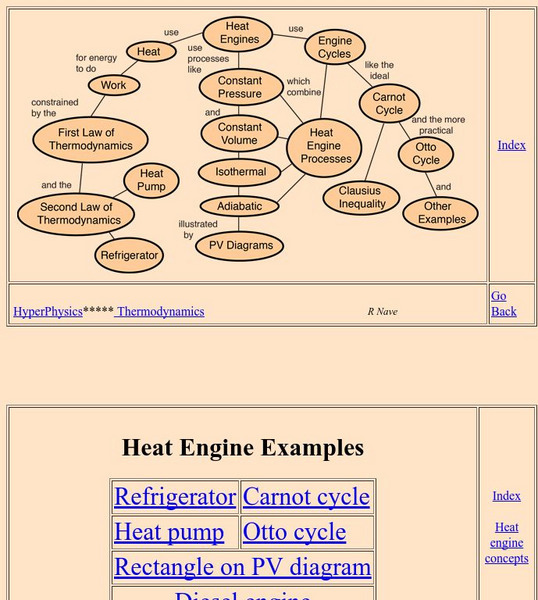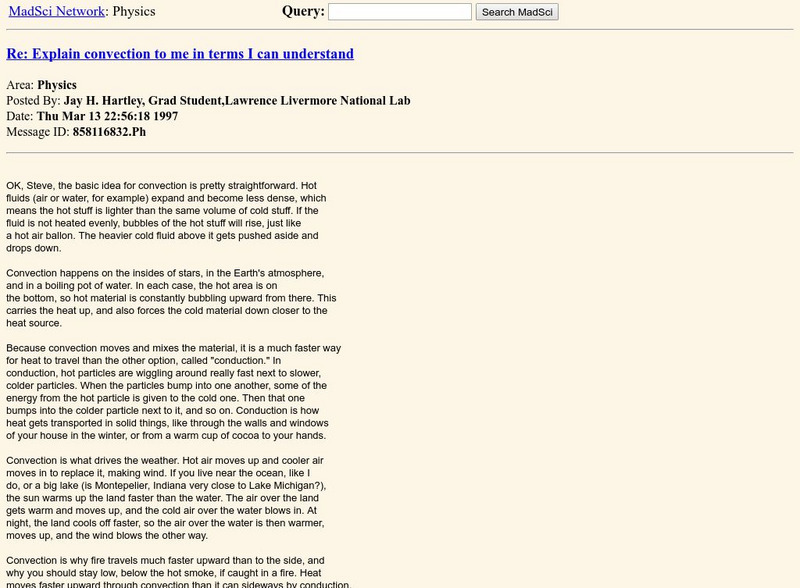ClassFlow
Class Flow: Heat
[Free Registration/Login Required] This flipchart investigates how heat is produced and the effects of heating and cooling and demonstrates how a change in temperature indicates a change in heat. Students will sequence objects according...
E-learning for Kids
E Learning for Kids: Science: Titanic Shipwreck: How Does Heat Travel?
David is exploring the Titanic shipwreck. He needs to stay warm down below in the water. Help him learn about heat and temperature.
Other
Taftan: Applied Thermodynamics
A definition of applied thermodynamics, the science of the relationship between heat, work, and systems that analyze energy processes. Related links.
FT Exploring
Ft Exploring: The Second Law of Thermodynamics
Learn about one of the most misunderstood principles of physics, the second law of thermodynamics.
E-learning for Kids
E Learning for Kids: Science Underwater City: What Are Good and Poor Conductors of Heat?
John and Jessi are going underwater, and they need to stay warm. Help them learn about conductors of heat so they can stay warm.
Georgia State University
Georgia State University: Hyper Physics: Zeroth Law of Thermodynamics
The principle of thermal equilibrium is discussed and explained. The zeroth law of thermodynamics is stated. Links to several other pages with related information are provided.
Georgia State University
Georgia State University: Hyper Physics: Radiation Cooling of Body
Discusses the means by which the body regulates its temperature. The role of radiation in this process is explained. An equation for calculating the rate at which energy is transferred by radiation is presented. Also, an interactive...
TeachEngineering
Teach Engineering: Hot Cans and Cold Cans
Students apply the concepts of conduction, convection, and radiation as they work in teams to solve two problems. One problem requires that they maintain the warm temperature of one soda can filled with water at approximately body...
Georgia State University
Georgia State University: Hyper Physics: Heat Engine Cycle
The heat engine cycle is defined and discussed. So pressure-volume diagrams are introduced and their use in depicting the cycles of a heat engine is demonstrated. Informative graphics are accompanied by reason-filled explanations.
Georgia State University
Georgia State University: Hyper Physics: Area Expansion
The concept of area expansion is presented and explained. An equation for calculating the amount of area expansion is provided.
Georgia State University
Georgia State University: Hyper Physics: Temperature Concepts
An indexing page which includes links to a wealth of pages detailing the conceptual meaning of temperature. A hypertext format allows the visitor to quickly gain access the desired information.
Georgia State University
Georgia State University: Hyper Physics: Heat Flow to Hotter Region
Heat flow from a hot region to a cold region is described and explained. Applications of this phenomenon (specifically heat pumps and refrigerators) are discussed. Excellent graphics.
Georgia State University
Georgia State University: Hyper Physics: Heat Engine Concepts: The Otto Cycle
Schematic diagrams illustrating the operation of a four-stroke engine cycle. Interactive buttons allow you to step through the various steps of each engine cycle. Each graphic is accompanied by an excellent explanation.
Georgia State University
Georgia State University: Hyper Physics: Heat Engine Concepts: Carnot Cycle
The Carnot cycle is described, illustrated and explained. The Carnot efficiency equation is given and interactive JavaScript form allows the visitor to investigate the effect of the reservoir temperature and the sink temperature upon the...
Georgia State University
Georgia State University: Hyper Physics: Heat Engine Concepts
An indexing page for the HyperPhysics site. The page contains a concept map of links to a variety of other pages which discuss concepts related to heat engines. All pages contain informative graphics and excellent explanations.
Georgia State University
Georgia State University: Hyper Physics: Heat Pump
Heat flow from a hot region to a cold region is described and explained. Applications of this phenomenon (specifically heat pumps and refrigerators) are discussed. Excellent graphics.
Georgia State University
Georgia State University: Hyper Physics: Temperature
A page describing the concept of temperature and temperature scales. An interactive JavaScript form allows the visitor to investigate the relationship between the Kelvin, Celsius and Fahrenheit scales; enter a value and allow the...
Science is Fun
Science Is Fun: The Fireproof Balloon
In this experiment, two balloons are each placed over a lighted match, but the one that has had water placed inside it does not burst. Includes an explanation of why that is so.
Chemistry Collective
Chem Collective: Camping Problem
Measure the enthalpy of a reaction and then create a solution warm enough to cook food.
Exploratorium
Exploratorium: Give and Take
A description of a museum exhibit that compares the heat radiated from two pieces of metal--one painted black and the other shiny. Great idea stimulus for a student project or lab investigation.
MadSci Network
The Mad Scientist Network: Physics
A page from the question and answer section of this useful site. The page responds to the user question: "Explain convection to me in terms I can understand." An excellent discussion of the method of convection.
Exploratorium
Exploratorium: Exhibit Cross Reference: Convection Currents
A description of a museum exhibit that illustrates convection and convection currents. Great idea stimulus for a student project or lab investigation.
TOPS Learning Systems
Tops Learning Systems: Top Science: Conduction and Convection [Pdf]
Experiment investigating conduction and convection of heat in water.
Exploratorium
Exploratorium: Science Snacks: Pie Pan Convection
In this experiment, students observe what happens when a pan of soapy, colored water is heated. They will see that convection currents cause the fluid to rise and sink in a localized convection cell.




